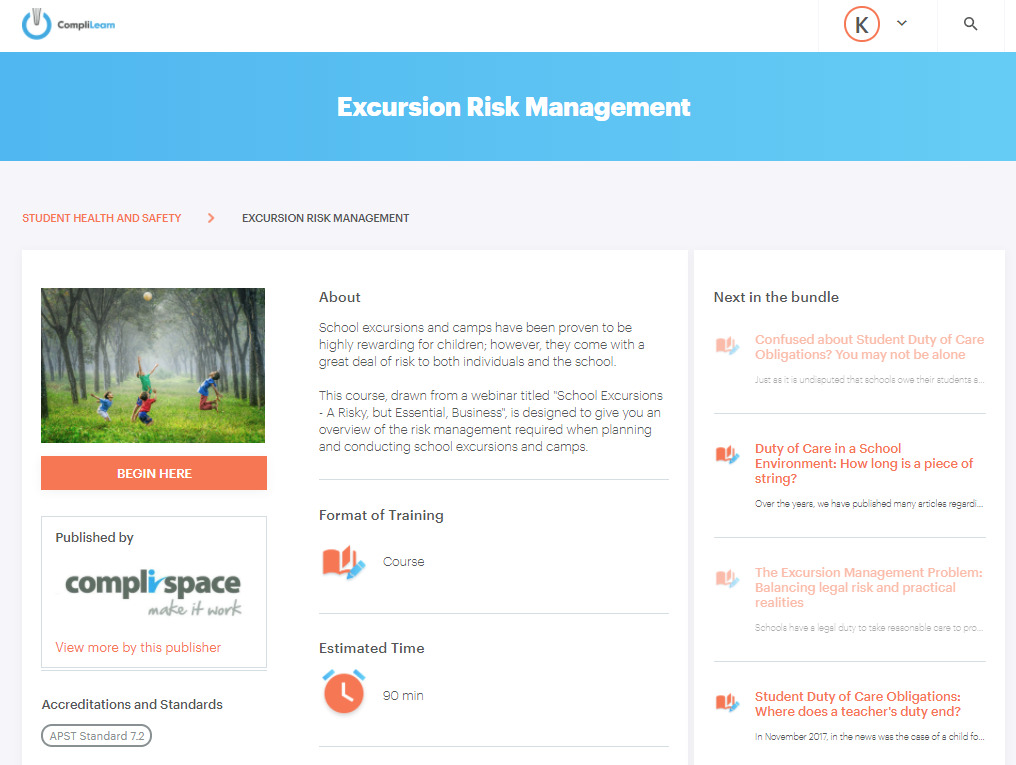2021: Excursions in Your Own Backyard - Strategic and Operational Risks

In Western Australia, there’s a new tourism slogan “We’re Free to Wander out Yonder” which, during this COVID-19 pandemic, is encouraging Western Australians to explore the wide-open spaces of their own state. This is all well and good for the citizens of WA and its schools, because they have the ability to travel ‘out yonder’ in WA with a very low risk of COVID-19 infection. Notwithstanding varied circumstances across the country, anecdotal evidence from many schools that we have spoken with in other parts of the country is indicating that a similar idea is being discussed at the moment in those schools, as they start planning their 2021 calendars of activity. They are still looking to plan camps, tours and excursions, but in their own backyards.
The reality is that any opportunity to take students on international tours does not exist in 2020 and, unless a vaccine is developed for COVID-19, is highly unlikely to exist in 2021. Apart from the fact that the Commonwealth and state and territory governments have almost stopped all international travel, even in ‘normal times’ schools are naturally cautious when it comes to taking students on camps, tours and excursions but particularly international trips. But the risk of having students or staff infected with COVID-19 in a foreign country would simply make most of us shudder.
We have argued in the past that risky activities need not be avoided, provided that proper precautions and safety measures are implemented. However, managing infection control generally is one matter. Having to deal with infection control of a disease that has a high mortality rate with no current vaccinations, in a third world country with language issues and possibly lower standards of health care is where we would promote risk avoidance as the most suitable control. Schools care for their students and staff first and foremost and will not, if they believe the risk is too great, place them in an untenable risk situation. In addition, and as noted in the 2014 Review of the Australian Curriculum, schools and teachers themselves have a genuine fear of being sued.
In this article, Craig D’cruz, a former principal and Jamie Bobrowski, a former school camps and compliance officer, team up together to provide schools with some insights into the strategic (Craig) and operational (Jamie) risks associated with camps, tours and excursions in 2021.
At the end of the article, you will find information about a free, online course on Excursion Risk Management, available through CompliLearn.
Are There Any Strategic Excursion Risks?
Craig says that, in a nutshell, of course there are.
If you type “excursion strategic risks” into a Google search, two of the first three items that come up are School Governance articles. In 2014, School Governance noted that school trips and outside activities are becoming recognised as a key risk for schools. Schools had clearly identified that excursions were a risky business and that, before excursions were approved, they needed to identify, assess and apply control strategies to excursion risks. However, the identification of the risks and the development and application of any controls often dropped onto the shoulders of the organising teachers. The second article, "Properly Considered Risk Assessments for Excursions" provides far more details and insights into how schools should be assessing the risks in relation to any camp, tour or excursion.
A major strategic risk for camps, tours and excursions is if the excursion or an activity on the excursion breaches the school’s mission or code. Schools spend many years developing their culture and their reputation and a single careless error can result in what could be irreparable reputational damage, let alone injury or death of a student or staff member.
Leaving aside the plethora of excursions that don’t have a valid educational purpose, the school would suffer immense reputational damage if an excursion was allowed to take place and either the excursion or activities within the excursion breached the school’s mission and purpose and there was an incident that resulted in injury or worse.
Other major strategic risks would include:
- the governing body fails to review current strategies and programs that position the school as offering a wide variety of academic enrichment and extra-curricular excursions and activities in the light of potential continuing COVID-19 pandemic restrictions.
- failure to undertake planning and provide sufficient resources to enable academic enrichment and extra-curricular excursions to continue to operate when restrictions allow.
What are the Key Operational Risks?
There are a number of key operational risks that schools should be considering when planning excursions including those ‘closer to home’ as set out below. Jamie outlines the operational risks to consider for every excursion. These are especially important when evaluating and booking new venues or suppliers.
Students
Operational risks or things that schools can control in relation to students are matters and issues such as:
- Are there any high risk medical students i.e. with asthma, diabetes, anaphylaxis or seizures?
- Are there any food or non-food related allergies, like latex, bees, nuts or dairyand, if so, what alternatives and controls are in place for any of the affected students?
- How many students does the venue accommodate, is the accommodation appropriate for the age and year level and is the accommodation safe?
Staffing
Matters for schools to consider when thinking about operational risks regarding staffing would include:
- What staff: student ratios do we need to ensure we can run the activities that we are intending to run?
- What qualifications do the venue staff have and what qualifications do our own staff have and all need?
- Is there any professional development training that we need to consider before we take students on this experience?
- Have we checked the availability of some of the staff and will the relevant/preferred staff be available for the relevant excursion?
Transport
Operational risks to consider include:
- Is the bus or relevant vehicle registered, insured and roadworthy?
- Do the drivers have appropriate and endorsed driver licences, and do they have a Working with Children Check?
- Does the bus or relevant vehicle have GPS?
- If using public transport, do we need e.g. Myki or Opal cards?
Venue
Operational risks are wide ranging and so are the potential venues. They could include stadiums, beaches, classrooms, museums, courtrooms and campsites and other outdoor environments. Questions to ask as part of venue due diligence include:
- How far away is the venue?
- Is there somewhere closer that can offer the same experience but involves less travel time?
- Does the venue have public liability insurance?
- Are the toilet and shower facilities appropriate and safe?
- Is there an emergency management plan?
- Are venue staff trained, licensed and accredited?
- Are the activities safe (more on this below)?
- Who lives on site and do all those staff have Working with Children Checks?
- Do we have a copy of the evacuation plan on file? Will students and staff be briefed about it?
- Are there First Aid kits, a defibrillator or spare epipens?
- Where is the nearest hospital?
- Is there ambulance access?
Accommodation
Risks involve the actual place that you will sleep and include many of the above risks. Other things to consider are:
- Is the accommodation suitable for the age group or year level?
- Are showers and toilet facilities safe and do staff and students have separate facilities? If camping, who else might be at the campsite i.e. the public?
- Is it clean and does it meet COVID-19 protocols?
- Are there security cameras to monitor any ‘escape attempts’?
- Is there vehicular access if camping?
Food and Refreshments
Where should schools start? A good starting point is to ask these questions:
- Do any of the attending students have a high risk food related condition or allergy? If so who and how many?
- What are the allergens, are they food-related or environmental?
- What food is served at the venue or, if a camp, what if students share food and what if something happens?
- Do we have appropriate First Aid kits, how many epipens do we need, do students need to bring additional pens from home?
- Will supervisors carry out a real time inspection of food being prepared and served?
Activities
The black hole…. let’s enter:
- Is the activity suitable, safe and appropriate for the age and year level?
- Are there regular inspections of the equipment and records of maintenance?
- Are the external providers, suitable for our students, accredited, qualified, licensed and insured?
- Is the weather suitable for climbing, swimming or bushwalking.?
- If there’s climbing involved, how will we communicate with students and do we need a megaphone?
- Is the equipment safe and are there signs of wear and tear?
- What do injured and ill students do when unable to participate? Who will supervise them and have we considered this?
In next week’s School Governance, Jamie will explore the practical things that schools can be doing now to prepare for the return of excursions and camps.
How to Manage Operational Risks: the Importance of Risk Controls
Risk controls should be established by the school to manage standard excursions risks such as transport and food etc. The school should be setting the controls that they expect staff to follow. In general, the usual approach to the planning of an excursion in many schools is that a staff member identifies the risks and then lists the controls.
The risk controls really are the responsibility of the school to establish and enforce. (e.g. the supervision ratios for each activity). Each excursion risk assessment will be different depending on the activities and the students attending. However, for every excursion, the lead staff member ought to be able to identify the operational risks and then know what the school expects in terms of the school risk control policy for that risk.
This is how a principal in a school (such as Craig) and their leadership team and those ‘on the frontline’ (such as Jamie) can work together to better manage excursion risks.
Summary
It is late August and schools are now planning, or perhaps finalising, their 2021 calendars. It should be fairly straightforward for schools to plan student free days, term dates, examination and reporting schedules and the raft of other administrative matters.
However, they will need to carefully consider large assemblies, celebrations of religious feast days or even parent/teacher interview nights. But these matters, like camps, tours and excursions, are very much part of the ‘value adding’ to the overall curriculum in each school.
Schools should continue to plan these ‘value add’ experiences at this stage provided that they manage both ‘old’ and ‘new’ risks and factor in that they may be using their ‘own back yard’ or be ‘wandering out yonder’.
Get Help with your Excursion Risk Management
CompliSpace has two solutions to help schools deliver simply safer excursions.
SafeTripBuilder - an excursion risk management tool that works with any excursion planning process, including paper-based or online process
PlanCheckGo - an excursion planning workflow tool that includes the SafeTripBuilder risk assessment tool
Click here to learn more and request a conversation or demo.
Free Online Course on Excursion Risk Management
Earlier this year, CompliSpace conducted a webinar series on Excursion Risk Management, that was attended by leaders from more than 400 schools.
Several polls were conducted during the webinars that revealed:
- 88% of schools do NOT train their staff on excursion risk management
- 80% of the time, excursion approvers reject risk assessments that have been submitted by teachers
- 83% of schools have no record of their excursion pre-departure briefing
- 82% of schools do not conduct post-excursion debriefs
CompliSpace converted one of these webinars into a free, online course and made it available through the CompliLearn Individual Explorer Account.
To access this free course for yourself:
- Visit complilearn.com
- If you have an Individual Explorer Account already, access it via the Login button in the top right
- If you don't, simply click the orange button that says "Free Individual Explorer Account" and sign up
- Search "Excursion Risk Management"
- Choose the course that says "Excursion Risk Management"
- Select "Begin Here" and follow the prompts
NOTE: If you are a CompliSpace school that subscribes to the Staff Wellbeing Learning List, then this course will be available in your staff learning system, so you can assign and report on this course as PD for your teachers and school staff.

About the Authors

Jamie Bobrowski
Jamie is member of CompliSpace’s Client Engagement Team. Jamie provides hands on risk and compliance experience from both the education and law enforcement sectors having spent 12 years as the Director of Governance, Compliance and Risk at St Patrick’s College in Western Victoria and a decorated 11 years with Victoria Police, where he was a Victoria Police Medal recipient. Jamie is a certified member of the Governance Institute of Australia with qualifications in Occupational Hazard Management, Risk and Compliance, Auditing, Frontline Management and Human Resources.

Craig D’cruz
With 37 years of educational experience, Craig D’cruz is the National Education Lead at CompliSpace. Craig provides direction on education matters including new products, program/module content and training. Previously Craig held the roles of Industrial Officer at the Association of Independent Schools of WA, he was the Principal of a K-12 non-government school, Deputy Principal of a systemic non-government school and he has had teaching and leadership experience in both the independent and Catholic school sectors. Craig currently sits on the board of a large non-government school and is a regular presenter on behalf of CompliSpace and other educational bodies on issues relating to school governance, school culture and leadership.
About the Author
.png)
Ideagen CompliSpace
Resources you may like
Article
Managing psychosocial hazards in schools: a legal and practical guide for school leaders
School leaders are becoming increasingly aware that workplace safety isn’t just about physical...
Read MoreArticle
Cyber security and AI in schools: emerging risks and governance imperatives
In an era where artificial intelligence (AI) tools are becoming as commonplace as calculators once...
Read MoreArticle
Under 16 social media 'ban’: an explainer for schools
The Australian Government passed a new law called the Online Safety Amendment (Social Media Minimum...
Read More
